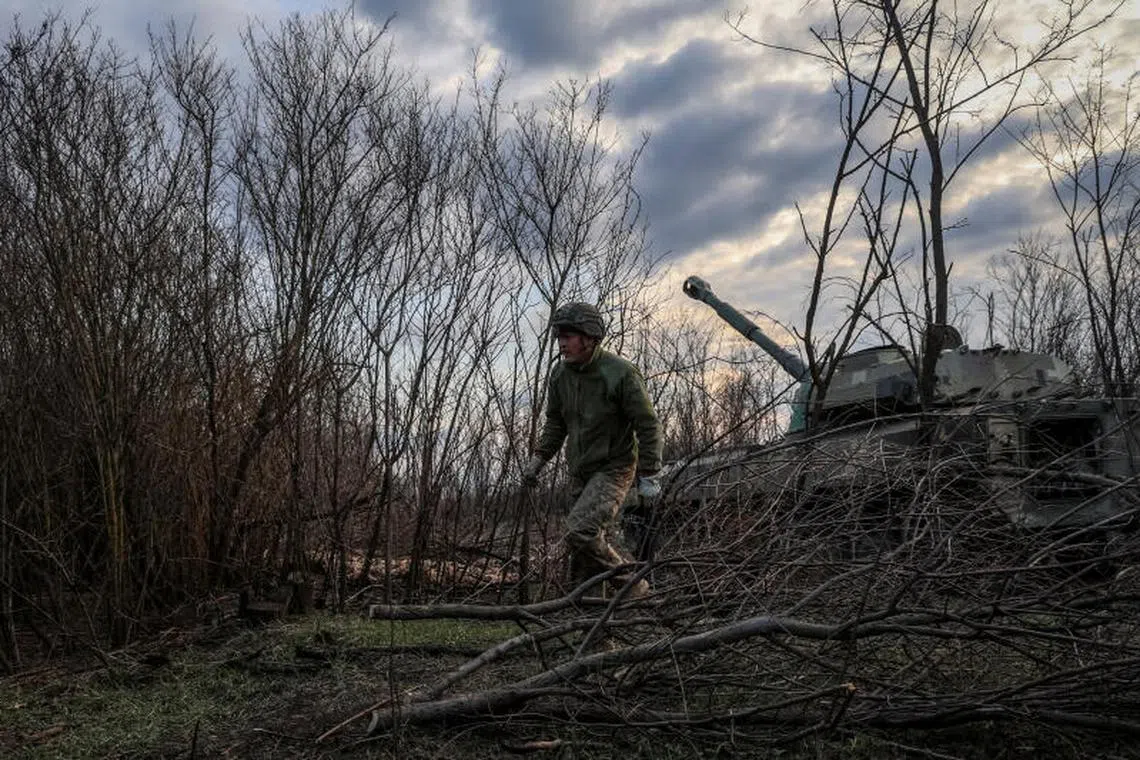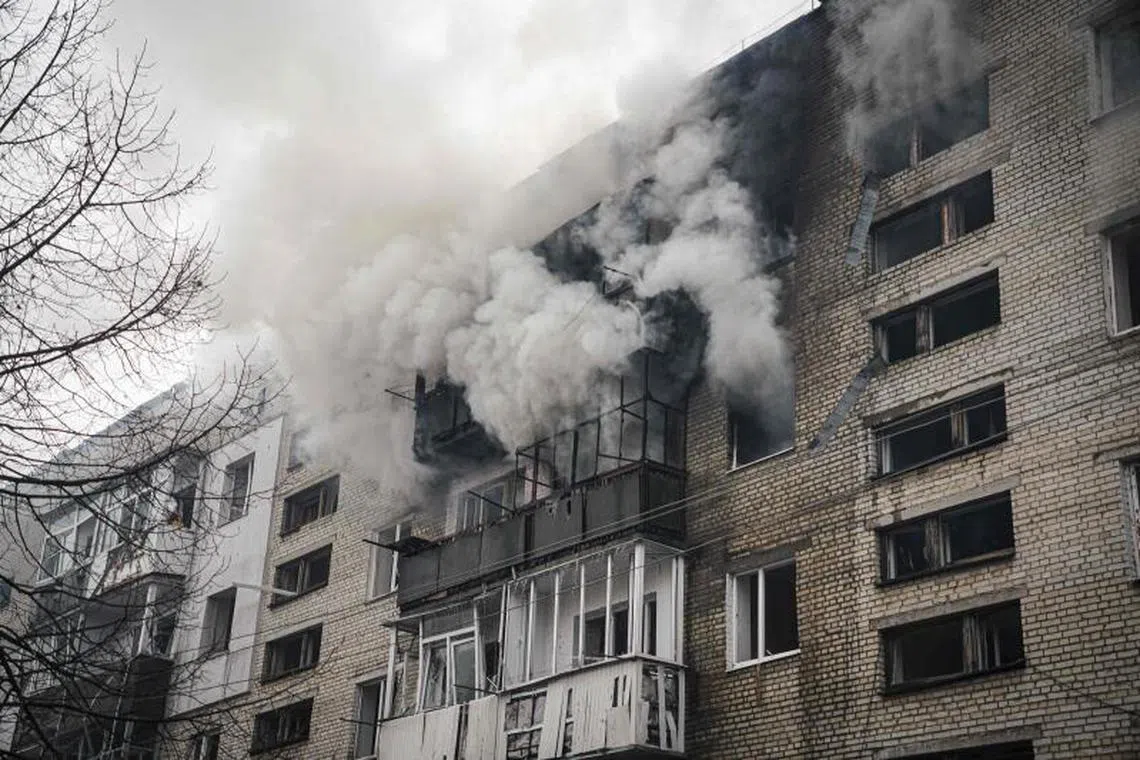US, Russia wrap up talks on proposed Black Sea truce in Ukraine war
Sign up now: Get ST's newsletters delivered to your inbox

A Ukrainian serviceman prepares to fire a 2S1 Gvozdika self-propelled howitzer in Kherson region, Ukraine on March 23.
PHOTO: REUTERS
WASHINGTON – US and Russian officials wrapped up day-long talks on March 24 focused on a narrow proposal for a ceasefire at sea
Even as the meeting was under way in Saudi Arabia, where a Ukrainian delegation was present on the sidelines, a Russian missile strike damaged a school and a hospital in Ukraine, wounding at least 88 people.
The talks, which focused among other issues on trying to reach a Black Sea maritime ceasefire deal, were portrayed by Washington as a step in President Donald Trump’s effort to end the three-year-old war.
A White House source said progress was being made in the Riyadh talks and that a “positive announcement” was expected “in the near future”.
Russia’s RIA news agency said the Russian delegation, when asked about their mood after the end of the talks, replied: “It’s good.”
A Russian source told Reuters that the talks had concluded late on March 24 and a draft joint statement had been sent to Moscow and Washington for approval, with the parties aiming to release it on March 25.
Kremlin spokesman Dmitry Peskov said earlier that no documents would be signed, the Tass agency reported.
Earlier on March 24, Mr Trump himself listed other issues he said were on the table: “We’re talking about territory right now. We’re talking about lines of demarcation, talking about power, power plant ownership.”
Last week, Russia rejected a proposal by Mr Trump for a full 30-day ceasefire in Ukraine, and it has so far agreed only to a moratorium on attacking energy infrastructure.
As the March 24 talks were being held in Riyadh, Russian missiles struck the city of Sumy in north-eastern Ukraine. Several high-rise residential blocks were damaged along with a school and hospital, regional governor Volodymyr Artiukh said in a video filmed in front of a blaze producing a column of smoke.
The schoolchildren were in a shelter at the time, averting worse casualties, he added.
“Moscow speaks of peace while carrying out brutal strikes on densely populated residential areas in major Ukrainian cities,” Ukrainian Foreign Minister Andrii Sybiha said.
“Instead of making hollow statements about peace, Russia must stop bombing our cities and end its war on civilians.”

Smoke billows from a residential building following a missile attack in Sumy, north-eastern Ukraine, on March 24.
PHOTO: AFP
Maritime truce?
The talks in Saudi Arabia follow phone calls last week between Mr Trump and the two presidents, Mr Volodymyr Zelensky of Ukraine and Mr Vladimir Putin of Russia. Ukrainian officials met the Americans
Mr Trump, who has scaled back US diplomatic backing for Ukraine and shifted publicly to a stance far less critical of Russia than that of his predecessor Joe Biden, says he aims to bring a quick end to the war.
The White House says the initial aim of the Saudi talks was to secure a maritime truce in the Black Sea, allowing the free flow of shipping.
But maritime battles have been a comparatively limited facet of the war since 2023, after Ukrainian attacks drove Moscow to move its navy far from contested waters, making it possible for Ukraine to reopen ports and resume exports at near-pre-war volumes.
“This is primarily about the safety of navigation,” Kremlin spokesman Peskov said. He said a previous UN-backed agreement on Black Sea shipping had failed to deliver some of Moscow’s demands.
A source briefed on planning for the Saudi talks said the US side was led by Mr Andrew Peek, a senior director at the White House National Security Council, and Mr Michael Anton, a senior State Department official.
Russia was represented by Mr Grigory Karasin, a former diplomat who is now chair of the Russian Upper House’s Foreign Affairs Committee.

A handout photo showing Russian delegation, advisor to the head of FSB Sergey Beseda (left) and Senator and former diplomat Grigory Karasin (centre) leaving a hotel after the talks in Riyadh, on March 24.
PHOTO: EPA-EFE
Mr Karasin was cited by Interfax news agency as saying during a break in the talks on March 24 that they were progressing “creatively” and that the two sides had discussed issues regarded as “irritants” in bilateral ties.
Mr Trump had expressed broad satisfaction over the way talks have been going and has been complimentary about Mr Putin’s engagement.
But major European powers doubt whether Mr Putin is ready to make real concessions
Mr Putin says he is ready to discuss peace but that Ukraine must officially drop its Nato ambitions and withdraw its troops from the entirety of four Ukrainian regions that Russia has unilaterally annexed.
White House national security adviser Mike Waltz told CBS’ Face the Nation on March 23 that the US, Russian and Ukrainian delegations were assembled in the same facility in Riyadh.
Beyond a Black Sea ceasefire, Mr Waltz said the teams would discuss the “line of control” between the two armies, which he described as “verification measures, peacekeeping, freezing the lines where they are”. REUTERS


